In this post, I will discuss my thoughts on the themes and story in Shooting Star Hill, a 2005 freeware visual novel from Japan that was translated into English in 2006 as part of the second al|together translation festival. I offer a spoiler-free review of Shooting Star Hill in a companion post.
If you think you may be interested in playing (or more aptly put, reading) the entirely free Shooting Star Hill, I recommend reading my spoiler-free review and downloading the story yourself (available on Windows, MacOS, and Linux) and saving this article for afterwards. I will note that the entire story can easily be read and completed within an hour.
However, if you are not worried about spoilers, you can safely read on (but, again, I recommend reading my review first.)
Related: This post is part of my ongoing project to review nearly 30 freeware visual novels that were translated from Japanese into English in three translation festivals that took place in 2005, 2006, and 2008. See my project overview, rolling list of completed reviews, and series archive.
June 4, 2022 Update: Minor technical and link fixes.
What is Shooting Star Hill?
I discussed Shooting Star Hill in detail in my spoiler-free review, but for those who are defying my recommendations by reading this post in the first instance – I will provide a brief introduction.
Shooting Star Hill is a doujin (roughly indie) freeware visual novel from Japan. It was released in Japan in 2005 and, with the consent of the creator, translated into English in 2006. The game remains free to download and read.
Although Shooting Star Hill has two endings – it is almost entirely linear – meaning that the story progresses without player input. Which of the two endings the player achieves depends solely on a single choice that occurs near the end of the story.
Shooting Star Hill centers on the growing relationship between Chihiro Naruse, an ordinary high school student who just transferred into a new school, and Kana Moriyama, a mysterious loner in his class. It is a sort of romance – albeit a peculiar one, as I will explain below.
Final Spoiler Warning
I will now discuss specific events from the story of Shooting Star Hill. Consider yourself fully warned.
Story Overview
Shooting Star Hill takes place in April at the beginning of a Japanese school year. The view-point character is Chihiro Naruse, a high school student who has just moved to a new city – Hoshigaoka – due to his father’s work. On his first day in town, he decided to go see a movie – aptly called the Miracle of Starhill. He described it as a British “cult science fiction movie.” According to Chihiro, the movie was about an old couple in Scotland whose daughter turned out to be an alien. The daughter saved the village from a storm on her 17th birthday but was taken away by a spaceship right after.
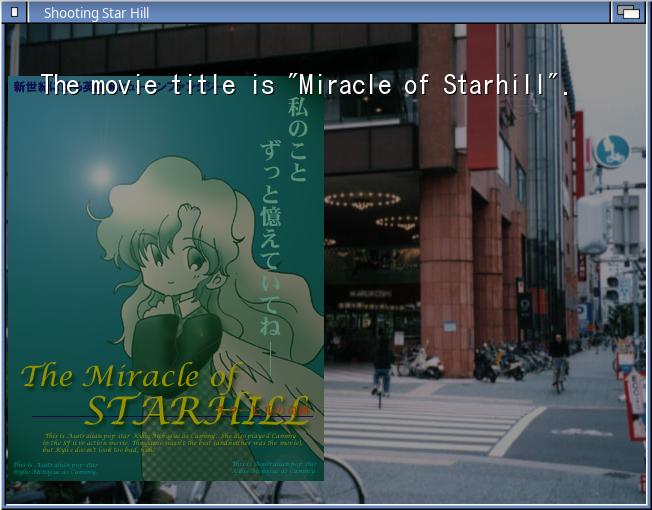
At the theater, a girl who was also seeing Miracle of Starhill caught Chihiro’s attention – first, because he was surprised that a girl his age was interested in an obscure British science fiction film, and second, because she was crying after the movie.
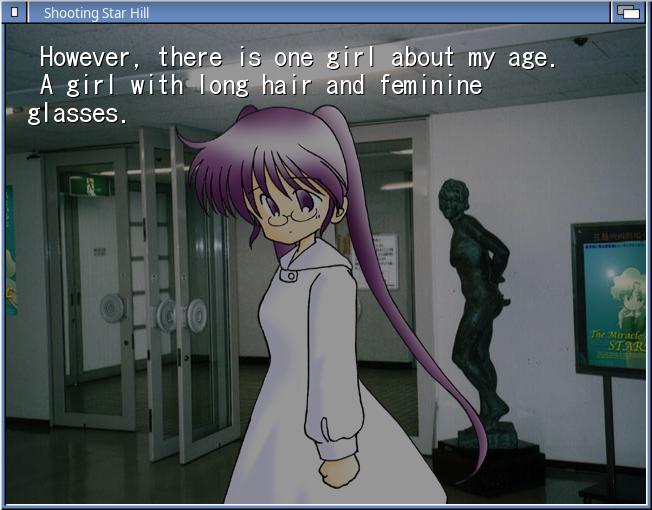
The next day, Chihiro attended his first day at his new school and discovered that the girl he saw at the theater – Kana Moriyama – was his classmate. He quickly resumed his interest in her. Chihiro was not deterred when he learned that Kana did not talk to anyone in the class and that was derided by her classmates with the nickname “alien.”
Chihiro decided to try to get to know Kana. On his second day at school, he unsuccessfully tried to initiate a conversation with her while she was eating lunch alone outdoors. On the third day, Chihiro, who made lunch for himself and his sister, brought “extra” lunch for Kana. While Kana was surprised and more than a bit confused, she accepted his Chihiro’s gesture and they were able to talk a bit.

After school, Chihiro learned from his classmate why Kana was called “alien.” Some years before, a club group that Kana was a part of found itself lost in the evening while orienteering on a mountain. Kana told her classmates to follow a moving light in the sky, which appeared to be a UFO, to find their way back to their cabin. While Kana turned out to be correct – her classmates were troubled by the fact that she knew to trust the UFO, as well as by the fact that she had recently moved back to Japan from Britain. Thus, her good deed led to her isolation.
During lunch the next day, Chihiro invited Kana to the zoo that weekend. Kana, again surprised and a bit confused, accepted Chihiro’s invitation. They had a pleasant time – or date – at the zoo, but there was one awkward moment wherein Kana pressed Chihiro to explain why he was interested in her. In Kana’s view, Chihiro’s interest was odd because she was “not normal” – a line Chihiro understood to be a reference to her “alien” reputation. Chihiro not only assured Kana that he did not care whether she was normal or not, but he also invited her out again the next day. Kana accepted this invitation as well, with the provision that she would only have until 3:00 PM.
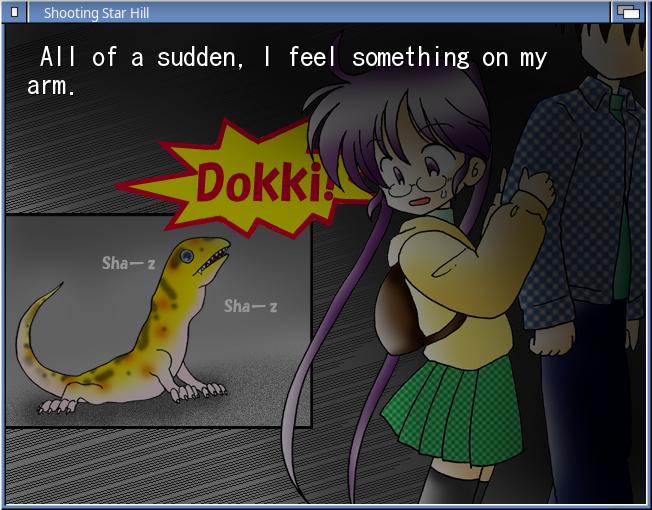
Chihiro and Kana were having a pleasant second date when Kana again asked Chihiro why he was interested in her – correctly guessing that he had been told why she was abnormal. Chihiro stated that he was not worried about it since they were having fun. He added that he could learn more about Kana and her circumstances over time.

In response, Kana cryptically asked Chihiro if he remembered that the protagonist of Miracle Star Hill was taken away on her 17th birthday. She then asked Chihiro what he would do if she was the alien who was going to be picked up. In Miracle of Star Hill, the boy who loved the alien heroine went to see her off. However, Chihiro confidently stated that he would stop Kana from leaving if she were the alien, which caught Kana by surprise. When questioned by Kana, Chihiro stated that if he could not stop Kana, he would go with her. Then, right on cue, Chihiro saw a UFO in the sky and Kana suddenly disappeared.
While looking for Kana, Chihiro ran into the British actress who had played the protagonist in Miracle of Starhill (her being in Japan had been foreshadowed earlier). She was looking for a certain Soushi Moriyama, who turned out to be Kana’s grandfather. Upon Chihiro’s introducing himself, Soushi noted that Kana had mentioned him and that he was the first classmate she had talked about – reinforcing our understanding of her isolation at school. He also noted that it was Kana’s 17th birthday that day.

Regarding the short actress subplot, the actress explained that her father’s idea to make Miracle of Starhill was prompted by something he had heard from Soushi – and she had become convinced that it was a true story. While Soushi did give her father the idea, he explained that the story Soushi told her father was entirely fictional.
(In the bad ending, we learn that the story in question was the Japanese legend of Princess Kaguya – which dates to at least the 10th century and involves a girl who was raised by a woodcutter before having to return to her home on the Moon. Suffice it to say, there is no indication that Soushi was aware that his granddaughter was actually an alien.)
The player is presented with a choice to make on behalf of Chihiro. Chihiro can either search for Kana or talk to Soushi to learn more about her.
Although Soushi appears to be a good guy, talking to him instead of immediately searching for Kan leads to the bad end. In the bad ending, Chihiro wakes up the next day and there is no evidence that Kana is still of the same world. Worse yet, Chihiro forgets Kana, but is tormented by the nagging feeling that he forgot something important.
If Chihiro leaves to find Kana, he will eventually find her at a tower (which had been foreshadowed on the zoo date). Kana was surprised that Chihiro found her, and more surprised that he believed what she implied about returning to space. She begged him to not to come closer because she felt like she could not be alone after meeting him. Chihiro, again undeterred, embraced Kana. A bright UFO hovered over them, but then disappeared, leaving Chihiro and Kana alone again. Chihiro, having fulfilled his promise, wished Kana a happy 17th birthday.

The next day, Kana and Chihiro walked to school together, and Chihiro had dinner with Kana and her grandfather. After dinner, Kana confessed her love to Chihiro.
What is Shooting Star Hill Really About?
I noted in my review of Shooting Star Hill that the story ultimately plays its twists straight. It heavily foreshadowed that Kana was an alien, and Kana turned out to actually be an alien of some sort.
The science fiction aspect of Shooting Star Hill is lightly explained. For example, we know that Kana is an alien, but the story does not see fit to answer questions about where she came from or why she was slated to go when she turned 17 – much less why Chihiro’s love for her was enough to allow her to stay. It is further unexplained how Soushi was not privy to the fact that his granddaughter was an alien. Finally, with respect to the bad ending, it is unclear how Kana’s existence was not only erased from the world, but also from everyone’s memories.
There are no decisive answers to the questions about the nature of Kana’s being an alien. I am not at all confident that the writer had a clear and distinct idea of how all the science fiction elements of the story worked. In many cases, I would consider an oversight like this – or at a minimum, a failure to explain – to be a major flaw in a work of art. However, Shooting Star Hill is not, as I understand it, a science fiction story. Granting that the Kana-is-an-alien point is played straight (as demonstrated in the bad end), Kana’s being an alien is merely the vehicle that Shooting Star Hill uses to explore its main ideas of loneliness, isolation, and invisibility.
Understanding the Story Without the Sci-Fi
To understand Shooting Star Hill, we must strip away the science fiction elements to get to the heart of Kana’s character.
Without the sci-fi aspects, Kana is simply – by her own eventual admission – a lonely girl who does not want to be a alone. She had been shunned by her classmates for years, mocked for being an “alien.” While Shooting Star Hill did make it clear that Kana actually was an alien, her reputation ultimately came from two things. Firstly, she was punished for the good deed of helping her lost classmates. Secondly, her classmates already saw her as being different because she had recently returned to Japan from studying abroad. Thus, the events that led to Kana being treated with cruel indifference are intelligible without reference to her actually being an alien.
Chihiro took an immediate interest in Kana without knowing anything about her other than the fact that she enjoyed the same kind of obscure foreign science fiction movies that he did. Unlike many anime and visual novel protagonists, Chihiro was not at all shy about his interest in Kana. He never denied it when teased by his classmate and he was proactive in taking the initiative to break the ice with Kana.
On Chihiro’s and Kana’s zoo date, Kana asked Chihiro why he was interested in her (this can properly be understood as asking why he was kind as well) in light of her being ambiguously “not normal.” To be sure, we know that Kana was actually an alien – but this can be understood entirely without the science fiction elements. Kana was an outcast. Chihiro, who had just transferred to the school, had already made friends. Perhaps most depressingly, Kana said that as someone who was not normal, she should not accept his favors – which I venture would have been better written as kindness. We could understand this, knowing the story, as Kana noting that she would soon be gone. However, it can be understood without the alien plot as well – Kana internalized her mistreatment and concluded that she did not deserve Chihiro’s attention, kindness, or favor.
Why was he spending time with an invisible girl? Chihiro provided one of the lines that defines the game:
You don’t know if I’m normal, or anything for that matter. I’m a high school boy that makes his own lunch. I may generally be considered not normal. Therefore I think that what’s normal and what’s not normal has no relevance to the person.
Chihiro Naruse
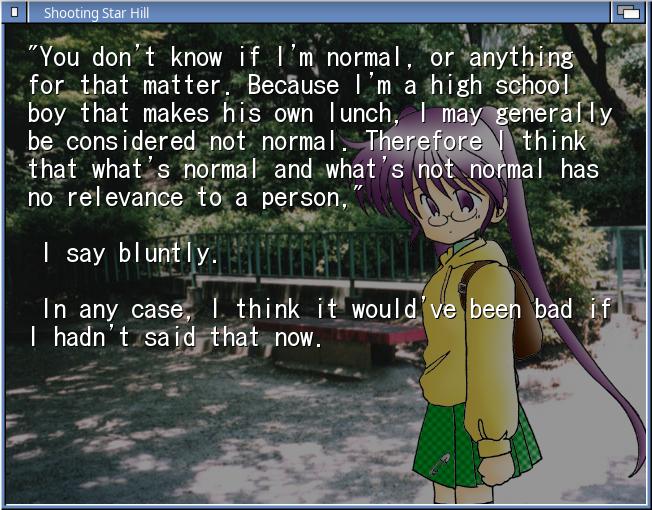
At this point, Chihiro did not know for a fact that Kana was an alien (although he had reason to believe that she was). His passage can be understood entirely as rejecting the reasons that others rejected her. She was the girl he liked – what other people thought of her was not “relevant” to who she was in Chihiro’s view.
There is another interesting point here. After giving his cumbersome answer to Kana, Chihiro stated that “it would’ve been bad if I hadn’t said that now.” This previewed another theme in Shooting Star Hill – the importance of saying what needs to be said when it needs to be said. Chihiro recognized Kana’s tentative question was a decisive moment – and he needed a clear answer to reassure her that he was aware of what other people thought of her and that he did not care about their opinions.
Kana presented Chihiro with the same question about her not being normal the next day. This time, she made specific references to her circumstances. After being surprised that Chihiro knew why she was called an alien and didn’t care, she pressed him further.
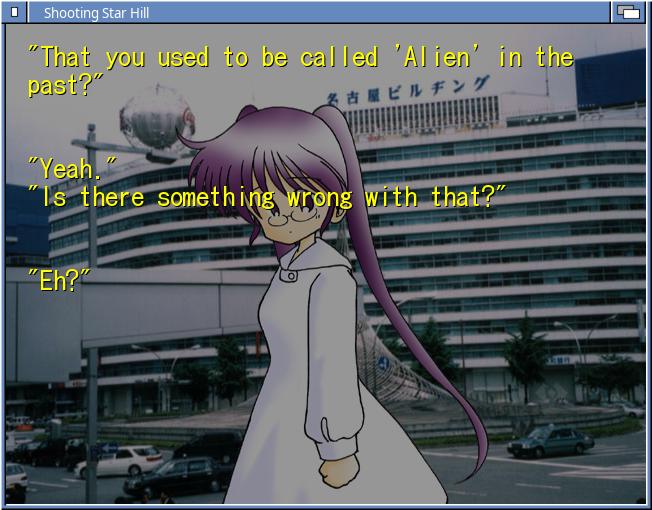
Chihiro: “Right now, I know that part of your story. Moreover, I’m having fun, so isn’t it okay? Normal and not normal, I don’t think I need to be restricted to those societal norms.”
Kana: “I … is that how you see things?”
Chihiro: “You probably have some special circumstances. Well, if we’re together like this, I’ll find out some day. Don’t worry about it now.”
This is one point where the English dialogue is a bit too vague – albeit that may derive from the original – but we can parse it with percision. (I will note that the “societal norms” line was probably a poor word choice based on the fact that it is not particularly relevant to Kana’s earthly or extraterrestrial challenges.) Again stripping the sci-fi plot, Chihiro’s point is that he likes Kana and enjoys spending time with her. He knows what his own feelings are and he knows that he feels the way he does regardless of what happened to Kana in the past or what anyone else thinks of her in the present. Chihiro also acknowledged that he did not yet know Kana well, but expressed his desire to spend more time with her and to learn about her past and present circumstances. He wanted to see the real Kana through his own eyes.
Having been convinced that Chihiro’s feelings for her were genuine, Kana then alluded to the fact that she would soon be whisked away by a UFO.
Can we understand this without the UFO?
We can indeed.

Kana asked Chihiro what she would do if she were going to disappear. Kana was already invisible at school, would Chihiro keep seeing her? Chihiro’s response was significant: Not only would he stop her from disappearing, he would even go to space with her. Keeping our assessment worldly, I think we can understand Chihiro promising that even if those around him questioned him for being close to Kana or began treating him the same way, he would stay by her side.
In the final scene where Kana was about to be taken away by a UFO, she pleaded with Chihiro to keep his distance from her.
Don’t come closer. Since I met you, I couldn’t be alone anymore. If you aren’t there, I can be alone.
Kana Moriyama
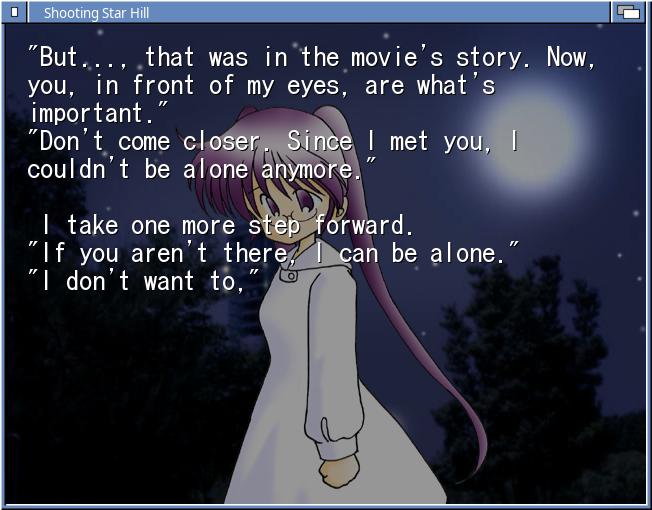
Kana had grown accustomed to being alone – to being shunned by those around her. But Chihiro rejected her plea – specifically because he did not want to be alone. In this line, Chihiro noted that his charity toward Kana derived not from pity, but rather from the fact that he wanted to be with her and spend time with her.
In Chihiro’s postscript, he noted that he did not understand the light, the UFO, or anything about Kana being an alien. He provided his own final assessment before meeting Kana:
That miraculous light saved children from danger, ended a girl’s loneliness, and one more time saved her, this time from solitude.
Chihiro Naruse
“I think that’s enough” – Chihiro ended his internal dialogue.
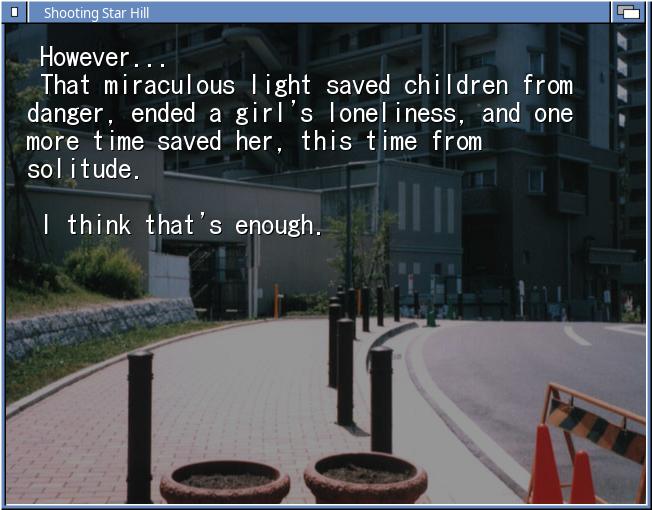
Indeed it was for the story of Shooting Star Hill. Kana was an alien, but the story was not about Kana being an alien. The story was about a lonely girl who had come to darkly accept that she was fated to be alone and invisible. She was prepared to disappear from the world in which her peers had decided that she may as well not exist. The light, and what came with it, set the stage for Chihiro to embrace her, to tell her that she was important to him, and that was all that mattered to him. What it took to save Kana was for one of her peers to see her as she was and to believe that there was something good beneath her disaffected facade.
The story ended with Kana’s love confession to Chihiro, who had more than reassured her that his feelings for her were genuine.
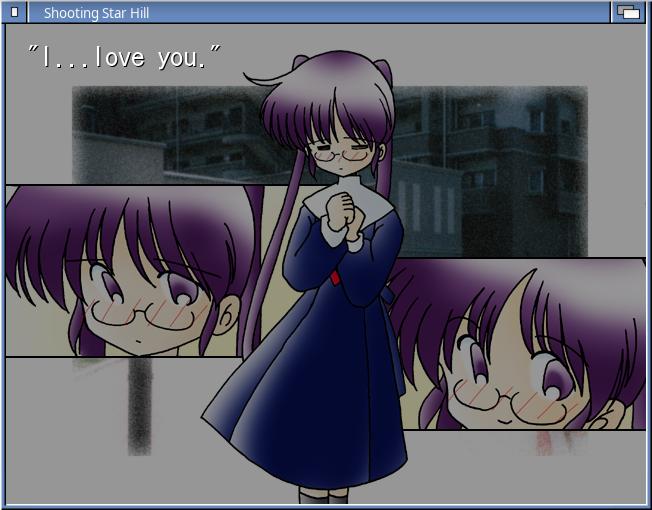
With that as a starting point, Kana could move forward from her 17th birthday in the world she and Chihiro shared.
On the Bad Ending
To obtain the bad ending for the game, Chihiro must choose to learn more about the story behind Miracle of Starhill from Kana’s grandfather instead of leaving to find Kana. The choice is not presented as unreasonable. Kana’s grandfather is a nice man and the game notes that perhaps Chihiro could learn something that would help Kana. However, when you place the choice in the context of Shooting Star Hill, it makes sense why that choice leads to the bad ending.
All of Chihiro’s bold statements and promises to Kana point to his wanting to see Kana through his own eyes and get to know her by spending time with her. With this context in mind, it makes sense that the correct choice for Chihiro is to find Kana expeditiously instead of trying to learn more about her from someone else – no matter how gentlemanly that someone else may be. Kana had ominously suggested to Chihiro a very short time before that she would be whisked away – and Chihiro had promised that he would either stop her or go with her. That promise, made by Chihiro to Kana, could only be fulfilled by Chihiro to Kana directly.
Without the bad ending, there would arguably be some ambiguity about whether Kana was actually an alien. However, in the bad end, Chihiro learns about the backstory of Miracle of Starhill from Kana’s grandfather, but never finds Kana. He wakes up to a world where Kana not only no longer exists, but never previously existed – all the while being tormented by the nagging feeling that he is forgetting something very important. This ending too is consistent with the theme. Recall that on the zoo date, Chihiro noted that it would have been bad if he did not have a clear response to Kana’s question about why he was interested in her. There is not always a second chance to do or say the right thing. Had Chihiro been too tentative to come up with answers to the questions that troubled Kana, their relationship may not have progressed. When the invisible girl was ready to fade away, Chihiro had only one chance to fulfill his promise to her.
Thus, our two lessons from the bad ending are that when trying to understand someone, the best place to go is to the person him or herself, and sometimes there are no second chances to do what needs to be done. One of my previous reviews in the instant project, From the Bottom of the Heart, looks at the aftermath of failing to say what needs to be said when one had the opportunity to say it (see review; analysis).
Final Assessment
Shooting Star Hill is a genuinely good piece because it is a simple piece with a simple message. It is, at its core, the story of a boy who likes a lonely girl regardless of what those around her think of her. His simple affection and determination to get to know her “save” her in the sense that she had been resigned to disappearing from the world before someone saw her and made clear to her that his world was better with her in it.
The story has two messages. Firstly, a bit of genuine kindness can help someone. Secondly, part of caring for someone is seeing and listening to them. Chihiro had little basis for taking the interest in Kana that he did in the first instance. But in getting to know Kana, he concerned himself strictly with seeing and listening to Kana and reaching his own conclusions about her. It was because of Chihiro’s earnestness and seriousness about seeing Kana as she was that he was able to on multiple occasions provide decisive answers to her probing questions. Moreover, it was because Chihiro was driven by his desire to remain with Kana and get to know her that he acted decisively in the good ending – rejecting the opportunity to learn about her from her grandfather and instead opting to find Kana and fulfill his promise to her directly.
In light of the true point of Shooting Star Hill, the story’s utter disinterest in explaining its science fiction elements is forgivable. The sci-fi aspects of the story served as a way to give the budding relationship between Chihiro and Kana a sense of urgency that could bring it to a proper conclusion – here a new beginning – in a very short story.
None of this is to say Shooting Star Hill is a masterpiece – the characters of Chihiro and Kana are only developed in the respects necessary to address Kana’s fundamental issue. Some potential for character development may have been lost by opting to pursue the overarching sci-fi plot. The dialogue did not contain the layers that we found in a shorter translation to come out of the al|together festivals, From the Bottom of the Heart. But the characters, as they were presented, were very endearing – and the game’s central ideas and messages were commendable.
The overall package – taking into account the story and the very good art direction – deserves more recognition. I hope that my two articles on Shooting Star Hill inspire some people to try the peculiar sci-fi/romance visual novel for themselves.
